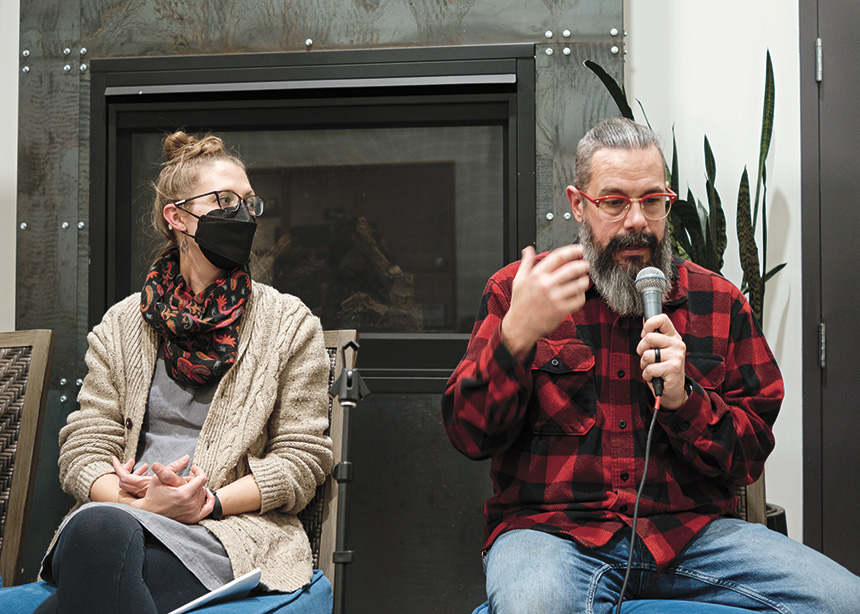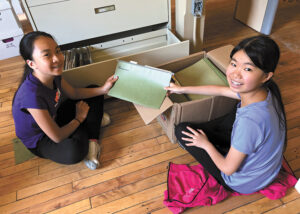In the current cultural climate, many churches, Mennonite ones included, are wrestling with the question of how to help members talk about faith and God’s work in their own lives. At a time when “evangelism” can seem almost like a four-letter word, how can people of faith bear witness to God’s movement in honest and authentic ways?
It was these sorts of questions that sparked “Eyes to see: Naming our divine encounters,” a panel discussion facilitated by Mennonite Church Saskatchewan and the New Leaf Network. The hybrid in-person/virtual event was held on Nov. 9 in Saskatoon.
“MC Saskatchewan has been partnering with the New Leaf Network for a while in various ways,” said Josh Wallace, interim executive minister of MC Saskatchewan. “This is the first event we’ve cooked up together, and we intended to create a conversation that would serve us [the regional church] and their [New Leaf’s] wider community.” The New Leaf Network is a “collaborative, relational and creative missional organization that supports, equips and connects church planters, spiritual entrepreneurs and missional practitioners in post-Christian Canada.”
The network seeks to fulfil its mission and equip people of faith through “online collaboration spaces, interactive learning workshops, events, storytelling and specialized coaching,” according to its website.
Josh also served as the emcee for the event. “This is one of the happiest parts of my job—listening to what’s going on in people’s lives and working with partners as we explore the creative, growing edge for what God is doing in our world,” he said.
The evening featured four panellists from four unique faith traditions and perspectives, each of whom was invited to share the places where they encounter God in their own journeys.
Sylvia Keesmaat, author of Romans Disarmed: Resisting Empire, Demanding Justice, was in Saskatoon teaching a graduate studies course on Romans through Canadian Mennonite University. When asked where she sees God in her midst, Keesmaat talked about meeting God in the plants and insects that inhabit her off-grid farm north of Toronto. “Sometimes, I have a hard time seeing God. It’s almost impossible to believe in God when I read the news in the morning, yet when I’m outside, it’s so easy to believe in God,” she said.
Cynthia Wallace, a member of the Backyard Church, a house church in Saskatoon, shared about meeting Jesus in the pages of novels and poetry, in friends and church members who offer practical care, and also through recent physical health challenges she has experienced.
“It’s not that Jesus’ suffering was exceptional; it’s that it was typical,” said Wallace. “In her poem ‘Descending Theology: Christ Human,’ Mary Karr offers a startling picture of the baby Jesus being made in our image as cross-shaped in our very bone structure, suggesting that just as we were made in his image, Christ was made in the image of our suffering.
“To be human is to know pain. So often I think I’ve been trained to look for God in moments of glory or perfection, but even Jesus’ resurrected body bore its scars, right? What might it mean, then, to centre Christ’s resurrection body: perpetually wounded and holy and good?” Wallace asked.
Talking about faith can be a tricky matter, but events like this help to find a way forward, said Eileen Klassen Hamm of Wildwood Mennonite Church in Saskatoon, who attended the event.
“I think one of the reasons it’s hard to talk about God’s work in our lives, [is because] we don’t want to presume we’re talking for God. We’re cautious for good reasons. At times, we’ve boldly said God is asking me to do this, and we’ve not been right about that. I think we’re right to be cautious about speaking for God, but then the question is, ‘How do we name how we experience God in good, healthy ways?’
“We’re reasonably humble, and don’t want to speak for God. But then the loss is that we then don’t talk about it at all. We take away the sacredness of lots of spaces, and every space is sacred. We’re losing all kinds of nuances,” she said.
For herself, Klassen Hamm said she sees God’s hand in the world around her, in the South Saskatchewan River that she visits almost daily: “The rewilding, spending time along the river has become so important to my daily and weekly routine, being outside, and attending to the daily changes. What Sylvia Keesmaat shared really resonated with me . . . seeing the magnificence of God in minute things. What is the offering for us, for me, on any given day? There is nothing that is not God’s realm.”
Do you have a story idea about Mennonites in Saskatchewan? Sent it to Emily Summach at sk@canadianmennonite.org.








Leave a Reply
You must be logged in to post a comment.